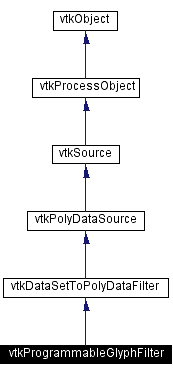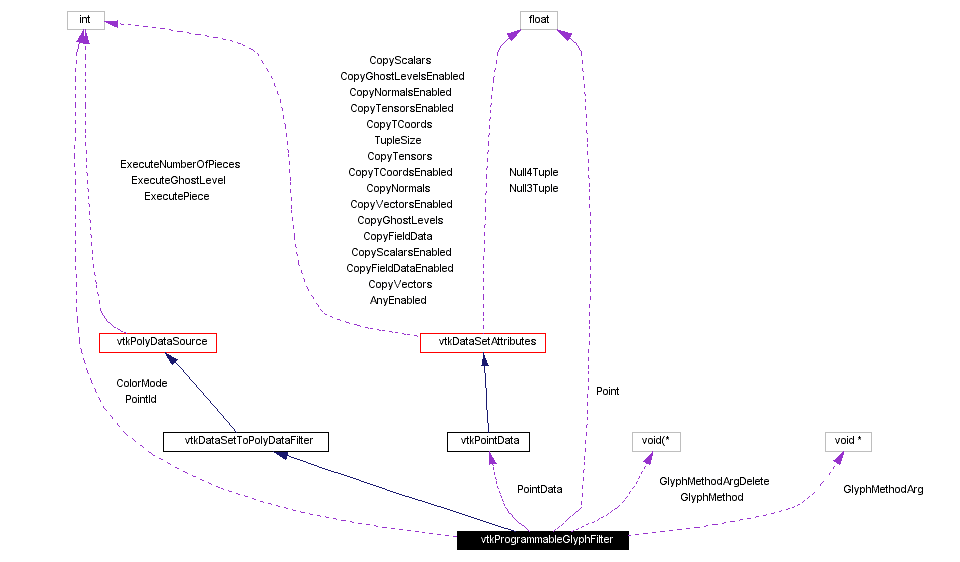Main Page Class Hierarchy Alphabetical List Compound List File List Compound Members File Members Related Pages
vtkProgrammableGlyphFilter Class Reference
control the generation and placement of glyphs at input points.
More...
#include <vtkProgrammableGlyphFilter.h>
Inheritance diagram for vtkProgrammableGlyphFilter:
 [legend]Collaboration diagram for vtkProgrammableGlyphFilter:
[legend]Collaboration diagram for vtkProgrammableGlyphFilter: [legend]List of all members.
[legend]List of all members.
Detailed Description
control the generation and placement of glyphs at input points.
-
Date:
-
2000/12/10 20:08:48
-
Revision:
-
1.13
vtkProgrammableGlyphFilter is a filter that allows you to place a glyph at each input point in the dataset. In addition, the filter is programmable which means the user has control over the generation of the glyph. The glyphs can be controlled via the point data attributes (e.g., scalars, vectors, etc.) or any other information in the input dataset.
This is the way the filter works. You must define an input dataset which at a minimum contains points with associated attribute values. Also, the Source instance variable must be set which is of type vtkPolyData. Then, for each point in the input, the PointId is set to the current point id, and a user-defined function is called (i.e., GlyphMethod). In this method you can manipulate the Source data (including changing to a different Source object). After the GlyphMethod is called, vtkProgrammableGlyphFilter will invoke an Update() on its Source object, and then copy its data to the output of the vtkProgrammableGlyphFilter. Therefore the output of this filter is of type vtkPolyData.
Another option to this filter is the way you color the glyphs. You can use the scalar data from the input or the source. The instance variable ColorMode controls this behavior.
-
Warning:
-
This filter operates on point data attributes. If you want to use cell data attributes, use a filter like vtkCellCenters to generate points at the centers of cells, and then use these points.
-
Warning:
-
Note that the data attributes (cell and point) are passed to the output of this filter from the Source object. This works well as long as you are not changing the class of the Source object during execution. However, if the class of the Source object changes, then the potential exists that the data attributes might change during execution (e.g., scalars available from one source and not the next), possibly fouling up the copying of data attributes to the output. In this case, you may have to manually set the output's copy flags (e.g., CopyScalarsOn/Off(), CopyVectorsOn/Off(), etc.) to control what's being copied.
-
See also:
-
vtkGlyph3D vtkTensorGlyph vtkCellCenters
-
Examples:
-
vtkProgrammableGlyphFilter (examples)
Definition at line 98 of file vtkProgrammableGlyphFilter.h.
Constructor & Destructor Documentation
| vtkProgrammableGlyphFilter::vtkProgrammableGlyphFilter |
( |
|
) |
[protected] |
|
| vtkProgrammableGlyphFilter::~vtkProgrammableGlyphFilter |
( |
|
) |
[protected] |
|
| vtkProgrammableGlyphFilter::vtkProgrammableGlyphFilter |
( |
const vtkProgrammableGlyphFilter & |
|
) |
[inline, protected] |
|
Member Function Documentation
| virtual const char* vtkProgrammableGlyphFilter::GetClassName |
( |
|
) |
[virtual] |
|
| int vtkProgrammableGlyphFilter::IsTypeOf |
( |
const char * |
type |
) |
[static] |
|
|
|
Return 1 if this class type is the same type of (or a subclass of) the named class. Returns 0 otherwise. This method works in combination with vtkTypeMacro found in vtkSetGet.h.
Reimplemented from vtkDataSetToPolyDataFilter. |
| virtual int vtkProgrammableGlyphFilter::IsA |
( |
const char * |
type |
) |
[virtual] |
|
|
|
Return 1 if this class is the same type of (or a subclass of) the named class. Returns 0 otherwise. This method works in combination with vtkTypeMacro found in vtkSetGet.h.
Reimplemented from vtkDataSetToPolyDataFilter. |
| vtkProgrammableGlyphFilter* vtkProgrammableGlyphFilter::SafeDownCast |
( |
vtkObject * |
o |
) |
[static] |
|
| void vtkProgrammableGlyphFilter::PrintSelf |
( |
ostream & |
os, |
|
|
vtkIndent |
indent |
|
) |
[virtual] |
|
|
|
Methods invoked by print to print information about the object including superclasses. Typically not called by the user (use Print() instead) but used in the hierarchical print process to combine the output of several classes.
Reimplemented from vtkSource. |
| vtkProgrammableGlyphFilter* vtkProgrammableGlyphFilter::New |
( |
|
) |
[static] |
|
|
|
Construct object with NULL GlyphMethod and no source object. The ColorMode is set to color by the input.
Reimplemented from vtkPolyDataSource. |
| void vtkProgrammableGlyphFilter::SetSource |
( |
vtkPolyData * |
source |
) |
|
|
|
|
Set/Get the source to use for this glyph. Note: you can change the source during execution of this filter. |
| void vtkProgrammableGlyphFilter::SetGlyphMethod |
( |
void(* |
f)(void *), |
|
|
void * |
arg |
|
) |
|
|
|
|
Specify function to be called for each input point. |
| void vtkProgrammableGlyphFilter::SetGlyphMethodArgDelete |
( |
void(* |
f)(void *) |
) |
|
|
|
|
Set the arg delete method. This is used to free user memory that might be associated with the GlyphMethod. |
| virtual int vtkProgrammableGlyphFilter::GetPointId |
( |
|
) |
[virtual] |
|
|
|
Get the current point id during processing. Value only valid during the Execute() method of this filter. (Meant to be called by the GlyphMethod.) |
| virtual float* vtkProgrammableGlyphFilter::GetPoint |
( |
|
) |
[virtual] |
|
|
|
Get the current point coordinates during processing. Value only valid during the Execute() method of this filter. (Meant to be called by the GlyphMethod.) |
| virtual void vtkProgrammableGlyphFilter::GetPoint |
( |
float & |
, |
|
|
float & |
, |
|
|
float & |
|
|
) |
[virtual] |
|
| virtual void vtkProgrammableGlyphFilter::GetPoint |
( |
float |
[3] |
) |
[virtual] |
|
| virtual vtkPointData* vtkProgrammableGlyphFilter::GetPointData |
( |
|
) |
[virtual] |
|
|
|
Get the set of point data attributes for the input. A convenience to the programmer to be used in the GlyphMethod. Only valid during the Execute() method of this filter. |
| virtual void vtkProgrammableGlyphFilter::SetColorMode |
( |
int |
|
) |
[virtual] |
|
|
|
Either color by the input or source scalar data. |
| virtual int vtkProgrammableGlyphFilter::GetColorMode |
( |
|
) |
[virtual] |
|
| void vtkProgrammableGlyphFilter::SetColorModeToColorByInput |
( |
|
) |
[inline] |
|
| void vtkProgrammableGlyphFilter::SetColorModeToColorBySource |
( |
|
) |
[inline] |
|
| const char* vtkProgrammableGlyphFilter::GetColorModeAsString |
( |
void |
|
) |
|
|
| void vtkProgrammableGlyphFilter::operator= |
( |
const vtkProgrammableGlyphFilter & |
|
) |
[inline, protected] |
|
| void vtkProgrammableGlyphFilter::Execute |
( |
|
) |
[protected, virtual] |
|
Member Data Documentation
float vtkProgrammableGlyphFilter::Point[3] [protected]
|
|
int vtkProgrammableGlyphFilter::PointId [protected]
|
|
vtkPointData* vtkProgrammableGlyphFilter::PointData [protected]
|
|
int vtkProgrammableGlyphFilter::ColorMode [protected]
|
|
void(* vtkProgrammableGlyphFilter::GlyphMethod)(void *) [protected]
|
|
void(* vtkProgrammableGlyphFilter::GlyphMethodArgDelete)(void *) [protected]
|
|
void* vtkProgrammableGlyphFilter::GlyphMethodArg [protected]
|
|
The documentation for this class was generated from the following file:
Generated on Wed Nov 21 12:57:53 2001 for VTK by
 1.2.11.1 written by Dimitri van Heesch,
© 1997-2001
1.2.11.1 written by Dimitri van Heesch,
© 1997-2001



 1.2.11.1 written by Dimitri van Heesch,
© 1997-2001
1.2.11.1 written by Dimitri van Heesch,
© 1997-2001